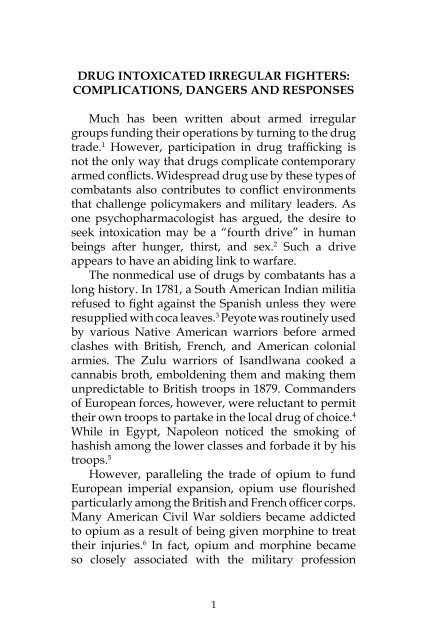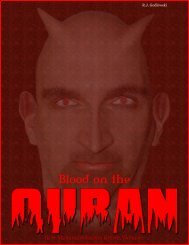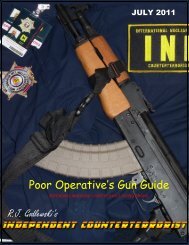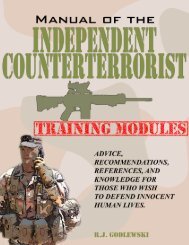R.J. Godlewski's The Independent Counterterrorist. I, Militia. June ...
R.J. Godlewski's The Independent Counterterrorist. I, Militia. June ...
R.J. Godlewski's The Independent Counterterrorist. I, Militia. June ...
- No tags were found...
Create successful ePaper yourself
Turn your PDF publications into a flip-book with our unique Google optimized e-Paper software.
DRUG INTOXICATED IRREGULAR FIGHTERS:<br />
COMPLICATIONS, DANGERS AND RESPONSES<br />
Much has been written about armed irregular<br />
groups funding their operations by turning to the drug<br />
trade. 1 However, participation in drug trafficking is<br />
not the only way that drugs complicate contemporary<br />
armed conflicts. Widespread drug use by these types of<br />
combatants also contributes to conflict environments<br />
that challenge policymakers and military leaders. As<br />
one psychopharmacologist has argued, the desire to<br />
seek intoxication may be a “fourth drive” in human<br />
beings after hunger, thirst, and sex. 2 Such a drive<br />
appears to have an abiding link to warfare.<br />
<strong>The</strong> nonmedical use of drugs by combatants has a<br />
long history. In 1781, a South American Indian militia<br />
refused to fight against the Spanish unless they were<br />
resupplied with coca leaves. 3 Peyote was routinely used<br />
by various Native American warriors before armed<br />
clashes with British, French, and American colonial<br />
armies. <strong>The</strong> Zulu warriors of Isandlwana cooked a<br />
cannabis broth, emboldening them and making them<br />
unpredictable to British troops in 1879. Commanders<br />
of European forces, however, were reluctant to permit<br />
their own troops to partake in the local drug of choice. 4<br />
While in Egypt, Napoleon noticed the smoking of<br />
hashish among the lower classes and forbade it by his<br />
troops. 5<br />
However, paralleling the trade of opium to fund<br />
European imperial expansion, opium use flourished<br />
particularly among the British and French officer corps.<br />
Many American Civil War soldiers became addicted<br />
to opium as a result of being given morphine to treat<br />
their injuries. 6 In fact, opium and morphine became<br />
so closely associated with the military profession<br />
1







